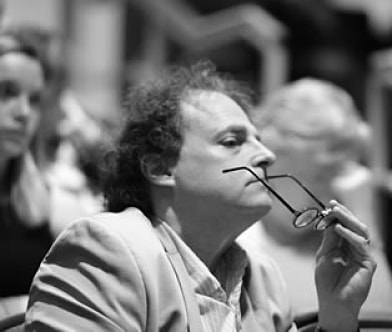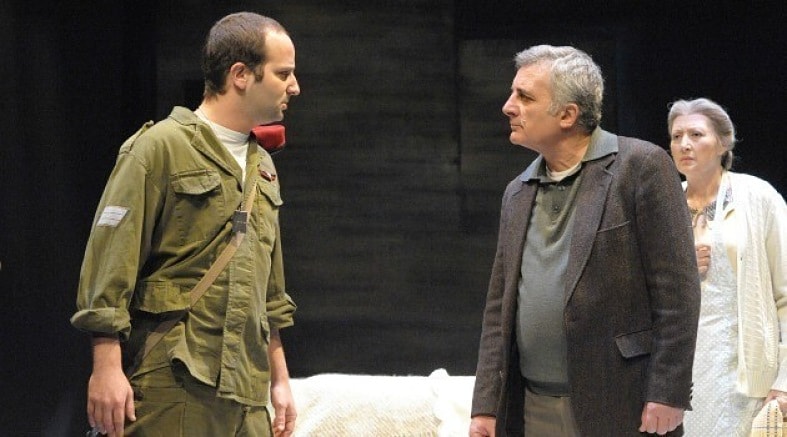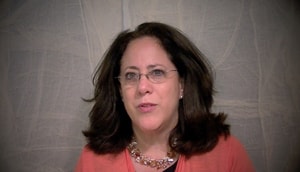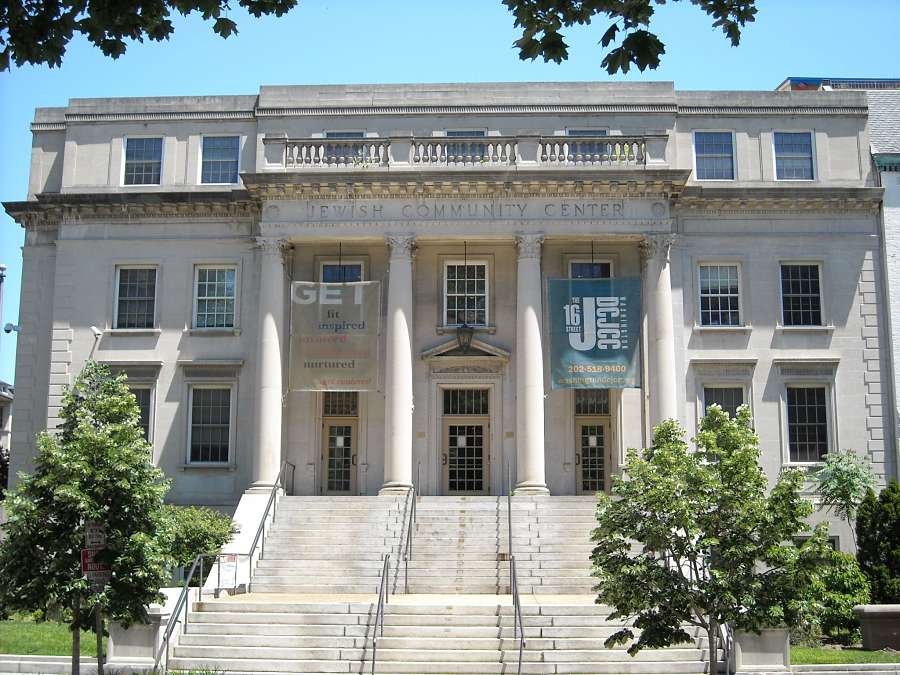
Whatever problems the Washington, D.C. Jewish Community Center was hoping to calm with its Dec. 18 dismissal of Ari Roth, artistic director of Theater J, it has instead stirred them to a fever pitch. In case you were distracted by the holidays, Roth—who ran Theater J, the nation’s most prestigious and well-known Jewish theatre for 18 years—was fired on the third night of Channukah, just days before the closing night of Tony Kushner’s The Intelligent Homosexual’s Guide to Capitalism and Socialism, With a Key to the Scriptures. Roth’s firing was as swift as it was abrupt: He was escorted from the building by security, and had to be let back in by a friend so he could watch the final performance of iHo and attend the cast party.
The ruckus began soon after. Or, perhaps, the ruckus simply continued, growing ever louder, as the long-brewing acrimony between Roth and DCJCC CEO Carole Zawatsky became more public. Roth, rarely a stranger to controversy, now finds himself at the center of it again.
The subject of the serial contretemps that have roiled Theater J since at least 2009 has remained constant. Always at issue has been that most contested of current events, the Israeli-Palestinian conflict—and, more specifically, what can and cannot be said about Israel in a Jewish theatre funded and housed by a Jewish community organization.
Theater J, after all, is not independent. It is a project of the JCC, receives funding from them, and is housed within their building. Zawatsky, the center’s CEO, has final say over its programming. And as even Roth concedes, the JCC has its own vision of what its commitment to Washington’s Jewish population means, and what it means to be a friend to Israel—a vision that was at times at odds with his programming, to put it mildly.
At first, controversy arose in 2009 around Roth’s decision to mount a staged reading of Caryl Churchill’s 10-minute play Seven Jewish Children, a sharply critical take on Israel’s 2008–09 incursion into Gaza. Although Theater J presented Seven Jewish Children in a night that included a speech from Roth about his personal conflicts over presenting it, along with three separate response plays contradicting it and a professorial talk denouncing it, some still viewed the staging of the play as offensive in itself. Jeffrey Goldberg, a former Israeli Defense Force prison guard and staff writer for the Atlantic, called the play a blood libel and published an argument with Roth about presenting it at the Atlantic’s site.
Goldberg wasn’t alone. An organization calling itself COPMA (“Citizens Opposed to Propaganda Masquerading as Art”) emerged for the express purpose of pressuring arts organizations out of presenting work perceived as anti-Israel.
It would not be the last time that COPMA, Roth and the DCJCC clashed. In 2011, Roth brought Tel Aviv’s Cameri Theatre to Theater J with financial support from the Israeli government to perform Boaz Gaon’s Return to Haifa, adapted from a Palestinian novel about a family returning to the home they evacuated during the 1948 War. This proved divisive—particularly to the nation that had sponsored the tour.

“The political end of the Israeli foreign ministry hated the idea of us bringing Return to Haifa over,” Roth says. “So you had this bizarre spectacle of an official Israeli government-sponsored tour coming to Washington to present Return to Haifa in Hebrew and in Arabic, with $2,000 set aside for a breakfast at the residency of Israel’s ambassador, Michael Oren, for 34 people, including the entire cast, where Oren got up and berated the cast and told them what a terrible play it was.”
All of this would pale in comparison, though, to the firestorm over Roth’s decision to stage The Admission, a play by Motti Lerner, a highly regarded Israeli Jewish playwright, early this year. Lerner’s play concerns the uncovering of a massacre of Palestinian civilians during the 1948 War. The subject of massacres during 1948 is controversial, although Israel’s own archives confirm multiple mass killings of civilians during the war. According to the Washington Post’s Marc Fisher, COPMA pressured donors to the DCJCC to withhold funding unless the play was canceled. Theater J downgraded the production to a workshop, but then a friend of the theatre funded a commercial run of the play at D.C.’s Studio Theatre (where, full disclosure, my mother, Susan Butler, sits on the board).
Theater J presented both Return to Haifa and The Admission as part of its biennial Voices from a Changing Middle East Festival. Not long after The Admission’s commercial run, the DCJCC’s Zawatsky canceled both the festival and, according to Roth, a planned workshop of his own play Reborn in Berlin, an act he calls “punitive. The redlining of my play, my workshop Reborn in Berlin—I just realized, ‘This is unsustainable.’ That happened in the spring; that’s when I knew that we should be working towards some kind of hopefully amicable separation.”
Roth considered many options for his changing relationship with the DCJCC. One was that Theater J would incorporate as an independent nonprofit housed within the DCJCC, thus shielding the DCJCC from blowback from his programming while ensuring it remained part of the community. Another would be for him to shrink his role within Theater J and spin off the Voices festival into an independent entity that he would run.
A third would have Theater J remain a part of the DCJCC but with a “redefining” of the artistic chain of command that would “restore Theater J’s artistic integrity.” A fourth, at the time unmentioned idea was that Roth would leave to found his own company, called Mosaic, to be housed at the Atlas Performing Arts Center in Northeast D.C. (Roth would announce the formation of Mosaic immediately following his firing.)
In November, a document detailing a back-and-forth between Roth and the JCC over these various options was leaked to the Jewish Daily Forward, alongside a letter of resignation from DCJCC board member Deborah Carliner. Roth contacted the press to comment on the story. Zawatsky got wind of the exchange, and, as an e-mail she sent him makes clear, was furious:
Your action today in speaking the reporter from the Washingtonian and your continued statements in the press dividing Theater J from the DCJCC is [sic] an act of insubordination. You are an employee of the DCJCC and therefore are required, as are all staff, to work with the Director of Communications and the CEO on all press activities. You have been warned several times and continue to act outside the bounds of the DCJCC protocol. Additionally, you did not inform me of the press interview after talking to the reporter. He read a letter you sent to the Forward that was particularly divisive about your relationship with the DCJCC. These actions are damaging and need to stop.
Not quite a month later, Roth was fired and the outcry began. As a series of articles by the Washington Post’s Peter Marks have made clear, the theatrical community has sided firmly with Roth. Kushner penned an impassioned denunciation of the decision that the cast of his show read at curtain call, and a petition signed by dozens of prominent national artistic directors expressed outrage at Roth’s firing, calling it a violation of “the principles of artistic freedom and free expression that have been at the heart of the nonprofit theatre movement for over half a century.” On Twitter, playwright Jon Robin Baitz called on “theatre artists of conscience to decline any invitation to work at Theater J,” and added in an e-mail that Roth’s firing represents “a victory for narrow-minded, anti-intellectual middlebrows who are threatened by someone who knows the only way forward is by rigorously exploring viewpoints not held by his ‘constituency.’”
On Monday, Dec. 21st, just four days after the firing, Zawatsky wrote Theater J’s council—which functions like a board but does not have a board’s legal responsibilities—an e-mail titled “My Actions,” in which she apologized for “any lack of respect you may have felt from me” and asked “that we please begin to work toward healing together.”
One council member I spoke to anonymously said she was “horrified at the way [Roth] was treated,” and that his firing was “shameful.” She said she understands why he was controversial, but that freedom of expression is paramount. “I get it. Israel is always singled out. But still—this is what we’re about in America.” When asked about the future of the current Theater J council, she said, “The board is going to try to support this season. After that, who knows?”

According to both an e-mail Zawatsky sent to the Israel Arts Community and an interview she gave me, however, everyone has this story wrong. Ari Roth was not fired because the DCJCC decided to crack down on criticism of Israel. On the contrary, this whole thing is about a power struggle between a CEO and an unruly employee.
“Ari Roth’s dismissal is related to a pattern of insubordination, unprofessionalism and actions that no employer would ever sanction,” the letter (first reported in the Washington Post) reads. It goes on to list a bill of particulars: that Roth was planning on leaving the theatre, that he had attempted in a power grab to seize control over Theater J and wrest it from DCJCC’s grasp, and that he was working on a new theatre company on the JCC’s dime.
Or, as she put it in a phone interview earlier this week, “We had come to a place where there was a disregard for the needs of the whole community. Ari’s need to work outside the bounds of the community became stronger than his connection to it.” She further clarified that by working “outside the bounds of the community,” she meant his work on Mosaic.
When asked if Roth’s firing was due to his staging work critical of Israel, Zawatsky is adamant. “Not only don’t I see it that way, but I really take exception to that. The DCJCC has a history and will continue to do work that challenges and invites conversations that are thought-provoking on a wide range of issues, Israel being one. The DCJCC committed to Return to Haifa, committed to The Admission. They were not censored. They were supported.”
She further explains that the Voices from a Changing Middle East festival was not cancelled due to its content, but rather because, as she puts it, “I think it’s very important that the art takes the lead. What’s most important about Theater J is producing strong art. Strong theatre. And I was seeing that the politics were beginning to lead, rather than the art.”
As for COPMA, “This had absolutely nothing to do with them. COPMA’s agenda is that we no longer do depictions of Israel in its complexity. We will continue to do work that presents Israel in all of its complexity. This is in no way a capitulation to COPMA or any other donor. At all.”
As evidence, she mentions that the DCJCC brought speakers such as Ari Shavit, whose book My Promised Land is very critical of Israel’s history in relation to the Palestinians. On the other hand, it should be noted that the DCJCC has had run-ins with critics of Israel before. As detailed by Marc Fisher in the Washington Post, the JCC canceled an appearance by the Brooklyn-based Jewish feminist punk band the Shondes due to “the band’s leader[‘s]…public statements questioning whether Israel should exist as a Jewish state,” and canceled an appearance by David Harris-Gershon, whose wife was severely injured by a Palestinian terrorist attack, because “he had written a blog post sympathetic to the boycott and divestment movement against Israel.”
When reached via e-mail for a follow-up comment, Roth unsurprisingly disputes Zawatsky’s charges. “I have all the e-mailed reprimands,” he writes. “None mention working on the other entity; I still don’t have a bank account for Mosaic, and I raised no money.” Indeed, none of the reprimands that I’ve been shown express any concern over Roth’s proposed independence.
In their own ways, both Zawatsky and Roth’s versions of the story identify the same problems: an untenable relationship between the theatre and the center, mirrored or manifested by their own untenable relationship; a document outlining possible ways those relationships could change; and Roth’s future plans for a new company and decision to leave. But both use these points of evidence for radically different, somewhat incompatible interpretations of the last few years.
And if you assume the politics of Israel-related programming was the cause of Roth’s firing, a few additional ironies seep into the story. For one, Roth is hardly a radical leftist on Israeli politics: He is instead a mainstream, left-of-center, two-state-solution-supporting moderate. He has said, both in his interview with HowlRound and with me, that he willingly embraced the DCJCC’s “red line” about work that promotes BDS (Boycott, Divestment and Sanctions, a movement that tries to use economic and cultural pressure to end Israeli occupation of Palestinian land).
What’s more, the work that actually landed him in hot water in the first place was a staged examination of whether or not a play by the greatest living English-language playwright was anti-Semitic—and then two plays by Israeli Jews attempting to reconcile with the events surrounding their nation’s founding.
But the past is prologue. Leaving aside the trail of events that brought Roth, Zawatsky, Theater J and the DCJCC to this impasse, the question is: What now?
It’s a particularly pressing question for Theater J’s council, most of whom joined because of Roth. Carliner, who resigned from the DCJCC’s board but remains on Theater J’s council, underlines this problem over the phone.
“In the beginning, the council was angry and upset and didn’t like the way Ari and the theatre were being treated,” Carliner says. “Starting on Saturday, the main thrust has been that we need to make sure that the season does okay—the rest of this season was definitely Ari. So it’s a tribute to him if it does well. But if it doesn’t do well, it will show that the community doesn’t like what’s happened.”

As for Theater J, it is currently overseen by managing director Rebecca Ende and acting artistic director Shirley Serotsky.
“It’s been emotional,” Serotsky says of the last week. “It’s been complex. It’s been everything that makes for great theatre. But the touchstone we stick to is that the art matters. The artist matters. And that’s certainly the way we always run. That part hasn’t changed at all. But we have known for a little while that Ari was leaving.”
Ende adds, “We’ve been trying to figure out how to navigate this challenging situation for months. It’s important to understand that Ari had been planning on launching this new company for months. That meant leaving Theater J. The timeline was still very tentative, but we were starting to look at what a 2015–16 season would look like without Ari as artistic director.”

Serotsky and Ende both insist that the artistic mandate of Theater J has not changed, despite Roth’s ouster. The rest of the staff of the theatre, all of whom played a part in season planning, hasn’t changed either.
“The policy about what can and can’t be produced at the DCJCC hasn’t changed,” Ende says. “We stay away from work that supports [boycotting Israel]. But that’s not new. That’s how we’ve operated for years. Beyond that, it’s about the individual plays and what feels right for DCJCC and what feels right for Theater J. Canceling the Voices from the Changing Middle East Festival does not equal changing the mandate of the theatre.”
Serotsky also confirmed that a search for a new artistic director will begin in late January as the theatre plans its next season (Theater J generally announces seasons in March), although the exact details of the search are not known at this time. According to Zawatsky, Theater J will “continue to do work from Israel, strong work from Israel, and that will not change.”
Meanwhile, Roth has found his plans for Mosaic “accelerating with this firing.” The new theatre will “do independent cultural performing that supports both a robust Voices from a Changing Middle East Festival and stages a whole series of intercultural encounters and fusions at the local, national, international level so that the theatre becomes the space for drama, dialogue and synthesis.”
Roth emphasizes that Mosaic will not be solely focused on the Middle East, calling Kushner and Jeanine Tesori’s musical Caroline, or Change the kind of show he’d love to program.
For her part, Carliner, who in addition to leaving the DCJCC board also recently stepped down as chair of the D.C. chapter of the ACLU, is unsure about her future affiliation with Theater J. She says she wants most of all to see Jewish organizations approach the subject of Israel with ethics, which to her means, “Letting people speak. We need a big tent. Now.”
UPDATE: In response to recent statements from DCJCC CEO Carole Zawatsky in the press, Stephen Stern, co-vice chair of Theater J’s council, wrote two lengthy posts on Facebook detailing his version of events, characterizing Zawatsky’s statement as, ” a distortion of the reality of what occurred.”
New York City–based writer Isaac Butler writes regularly about theatre.


